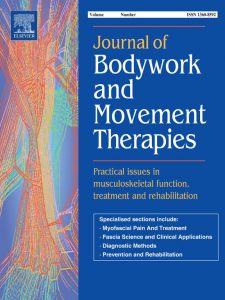Publications

The MyotonPRO: A reliable tool for quantifying the viscoelastic properties of a trigger point on the infraspinatus in non-traumatic chronic shoulder pain
Authors: Mélanie Roch, Mélanie Morin, Nathaly Gaudreault
Affiliations: Université de Sherbrooke, Faculté de Médecine et des Sciences de la Santé, École de Réadaptation, Centre de Recherche du Centre Hospitalier Universitaire de Sherbrooke, 3001, 12(e) Avenue Nord, Sherbrooke, Quebec, Canada
Journal: Journal of Bodywork and Movement Therapies - October 2020, Volume 24, Issue 4, page 379-385 (DOI: 10.1016/j.jbmt.2020.05.002)
-
Field & Applications:
- Medical
- Musculoskeletal disorder
- Musculoskeletal rehabilitation
- Physiotherapy
- Reliability
- Validity
Highlights
- There are currently no validated tools available in clinical practice to objectively measure a trigger point.
- The MyotonPRO is a portable non-invasive tool providing quantitative assessment of a muscle’s viscoelastic properties.
- The metrological properties of the MyotonPRO for measuring the viscoelasticity of a trigger point have not been reported.
- The MyotonPRO could discriminate the viscoelasticity of an infraspinatus trigger point from that of a non-trigger point.
- Excellent intra- and inter-evaluator reliability for assessing viscoelasticity of an infraspinatus trigger point was observed.
Introduction: Clinicians rely on palpation for locating and diagnosing trigger points in muscles. Measuring a trigger point with clinical palpation remains a challenge. There are currently no validated tools available in clinical practice to objectively measure a trigger point.
Method: The presence of a trigger point within the infraspinatus muscle was identified on thirty-five individuals with non-traumatic chronic shoulder pain via palpation according to Travell and Simons criteria. Trigger and non-trigger points were marked within the same muscle and the viscoelastic properties of both points were independently measured twice with the MyotonPRO by two evaluators on two days.
Results: Significant differences were observed when the trigger and non-trigger point (discriminant validity) were compared. The trigger points showed greater tone and stiffness compared to the non-trigger points (tone: 15.30 ± 1.99 Hz vs 13.57 ± 1.76 Hz; stiffness: 270.20 ± 46.96 N/m vs 227.86 ± 43.44 N/m; p < 0.05) and less elasticity (decrement of 1.13 ± 0.21 vs 1.06 ± 0.27; p < 0.05). The reliability of the three viscoelastic properties was found to be excellent for intra- and inter-evaluator reliability (ICC: 0.925-0.984 and 0.918-0.972, respectively) and good to excellent for test-retest reliability (between days) (ICC: 0.770-0.875).
Conclusion: The MyotonPRO can differentiate the viscoelastic properties of a trigger point from a non-trigger point. Our findings support the reliability of this myotonometer. This affordable and portable tool can be used to objectively measure viscoelastic properties of trigger points in the infraspinatus.
The MyotonPRO can discriminate the viscoelastic properties of a TP from an NTP located in the infraspinatus of individuals presenting with chronic, non-traumatic shoulder pain. The MyotonPRO is a reliable, affordable and portable tool that can objectively measure these properties in a clinical setting or for research purposes. This is an important breakthrough in the evaluation and treatment of musculoskeletal conditions associated with the presence of TPs, because as evidenced by Shah et al. (2015), theories surrounding the pathogenesis, pathophysiology, and contribution of TPs in the diagnosis of myofascial pain syndrome have so far been mainly speculative.


